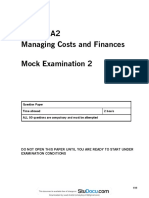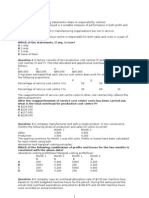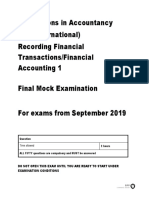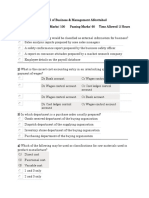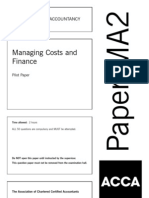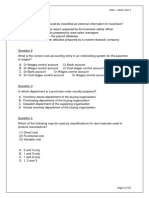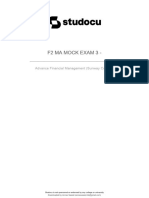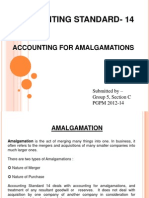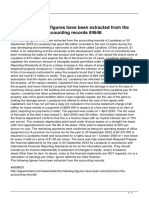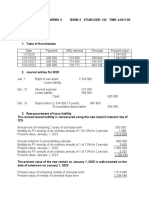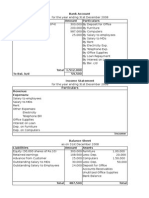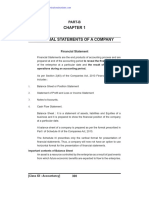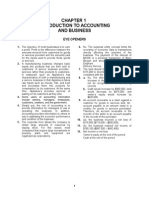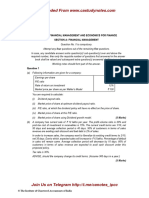Professional Documents
Culture Documents
MA1 Mock Exam 1
MA1 Mock Exam 1
Uploaded by
138.Mehreen “79” FaisalOriginal Description:
Original Title
Copyright
Available Formats
Share this document
Did you find this document useful?
Is this content inappropriate?
Report this DocumentCopyright:
Available Formats
MA1 Mock Exam 1
MA1 Mock Exam 1
Uploaded by
138.Mehreen “79” FaisalCopyright:
Available Formats
Mirchawala’s Hub Of Accountancy:
MA1:Management Information:
Mock Exam:1
Question#1:
Which of the following are advantages of using spreadsheets?
(1)They help accountants to perform calculations quickly and easily
(2)They enable data to be manipulated and numerical information to be analysed
(3)They remove the risk of errors in financial analysis
A. 1, 2 and 3
B. 2 and 3 only
C. 1 and 3 only
D. 1 and 2 only
Question#2:
What is an organisation chart designed to show?
A. Directions of responsibility
B. Aim of the organization
C. Main items of expenditure
D. Coding structure
Question#3:
What is meant by the classification of costs by Behaviour?
A. Classification according to whether costs are direct or indirect
B. Classification of costs as prime costs and overheads
C. Classification of costs as material, labour and other expenses
D. Classification according to how costs change with activity
Question#4:
What is a cost unit?
A. A number of different products combined together for cost analysis
B. A section of the business where a manager is only responsible for costs
C. The cost per unit of a product or service
D. A unit of a product or service which has costs attached to it
Question#5:
Forecast sales and production of product P in the next period are 6,000 units and 5,800 units
respectively. 50 litres of material M are used per 100 units of product P. Inventory of material M is
planned to be reduced by 60 litres in the next period.
What quantity of material M needs to be purchased in the next period?
A. 2,940 litres
B. 2,960 litres
C. 2,840 litres
D. 3,060 litres
Question#6:
Which accounts need to be charged for factory wages used in production?
A. Wages control, work in progress and production overhead
B. Work in progress and finished goods
C. Creditors and wages control
D. Wages control, production overhead and bank
From The Desk Of Sir Ahmed Shafi Page 1
Mirchawala’s Hub Of Accountancy:
Question#7:
A direct operative in a production cost centre worked for 41 hours in week 6. The basic week is 38 hours
and the basic rate of pay is $12 per hour. Extra hours are worked to meet the general needs of the
business and are paid at a premium of 20% above the basic rate.
How much of the direct operative's gross wages in week 6 would be charged as a direct cost?
A. $456.00
B. $492.00
C. $499.20
D. $535.20
Question#8:
A company has two divisions: North and South. The accountant is preparing a sales report totalling sales
from both divisions. The spreadsheet includes three worksheets: "Total", "North" and "South". The
layout of the spreadsheet is the same for each worksheet.
What formula will be used in cell C3 on the 'Total' spreadsheet to show the company's total sales for
Product 1 in January?
A. =NorthC3+SouthC3
B. =North!C3:South!C3
C. =North!C3+South!C3
D. =!NorthC3+!SouthC3
Question#9:
The management accountant is trying to display a large amount of data in a spreadsheet but finding it
difficult to prevent the column and row headings from scrolling off the screen. She wants to 'freeze' the
first four rows and the first three columns (shaded below) using the freeze panes function:
Where should the management accountant position the cell pointer when she clicks the 'Freeze
panes' function in order to freeze the first four rows and the first three columns as illustrated?
A. In cell D5
From The Desk Of Sir Ahmed Shafi Page 2
Mirchawala’s Hub Of Accountancy:
B. In cell C4
C. In cell D4
D. In cell C5
Question#10:
In the cost coding system of Company A each digit of a code represents a classification, with each digit
further to the right representing a smaller subset than the previous digit.
What type of coding system is Company A using?
A. Mnemonic
B. Block
C. Hierarchical
D. Sequential
Question#11:
Which of the following would occur in a production environment where process costing is used?
(1)Continuous production process
(2)Output of one process may become the input of the next process
(3)Output is always a single product
A. 3 only
B. 1 and 2 only
C. 1 and 3 only
D. 1, 2 and 3
Question#12:
Which of the following is/are advantages of using spreadsheets?
(1)They are suitable for holding very large volumes of data
(2)They enable data to be manipulated easily
(3)They enable complex 'what if' analysis to be performed quickly
(4)Large spreadsheets are unlikely to contain any critical errors
A. 2 only
B.1 and 4 only
C.1, 2, 3 and 4
D.2 and 3 only
Question#13:
Which of the following correctly describes the range of cells below?
A. C4:F8
B. C4:F4
C. C8:F4
D. F4:C8
From The Desk Of Sir Ahmed Shafi Page 3
Mirchawala’s Hub Of Accountancy:
Question#14:
The image below shows the 'Circular References' error message shown in a spreadsheet status bar.
What could cause a circular reference error?
A. A formula which includes a reference to its own cell address
B. A formula dividing a number by zero
C. A formula referring to a cell containing text
D. A formula which does not separate cell references correctly
Question#15:
Which of the following statements reflect attributes of real time processing in a computer data
processing environment?
(1)Control over the input of data is facilitated
(2)It is suitable for internal regular tasks
(3)Transactions are input and processed immediately
(4)Up-to-date information is always available
A. 1 and 2
B. 3 and 4 only
C. 1, 3 and 4
D. 2 and 3
Question#16:
Which of the following are usual tasks carried out by the accounts department in a large business?
(1)Preparation of the payroll
(2)Payment of suppliers invoice
(3)Quality control of finished product
(4)Deciding on selling prices
A. 2, 3 and 4
B. 2 and 3 only
C. 1 and 2
D. 1 and 4
Question#17:
Which of the following would MOST likely influence the content of a management information
report?
A. The cost of obtaining the necessary information
B. The degree of accuracy of the information within the report
C. Whether the information is from internal or external sources
D. The information requirements of the recipient of the report
Question#18:
Management needs information to make choices between alternatives.
Which purpose of management information is the above statement an illustration of?
From The Desk Of Sir Ahmed Shafi Page 4
Mirchawala’s Hub Of Accountancy:
A. Reporting
B. Planning
C. Decision-making
D. Control
Question#19:
A trainee accountant working in an accountancy practice carries out a variety of work for several clients
in a period.
What document may be used by the trainee to record the analysis of hours worked?
A. Clock card
B. Timesheet
C. Employee record card
D. Payroll extract
Question#20:
Which of the following statement(s) about coding is/are CORRECT?
(1)A code is a system of words, letters, figures or symbols used to represent other items
(2)Authorisation of transactions is not required if codes are used
(3)Costs are coded to facilitate their entry into the accounting records
A. 1 only
B. 2 only
C. 1 and 3
D. 2 and 3
Question#21:
Telecommunication costs incurred by a business each month are made up of a standing charge plus an
additional amount according to the volume of communications.
How would the telecommunication costs be classified?
A. Fixed cost
B. Stepped cost
C. Variable cost
D. Semi-variable cost
Question#22:
Which of the following correctly states the activities of a responsibility centre?
A. A profit centre is responsible for revenues only
B. An investment centre is responsible for costs and capital investment only
C. An investment centre is responsible for revenues and capital investment only
D. A profit centre is responsible for costs and revenues
Question#23:
The following information relates to a division of a business for a period:
Sales revenue $420,000
Capital employed $260,000
Net profit margin 10%
Cost of capital 8%
What is the residual income of the division?
A. $7,600
B. $3,200
C. 2%
D. $21,200
From The Desk Of Sir Ahmed Shafi Page 5
Mirchawala’s Hub Of Accountancy:
Question#24:
Which of the following statements would be TRUE if raw materials prices were rising?
A. Under LIFO production costs would be lower than under FIFO
B. FIFO would give a lower profit figure than LIFO
C. Periodic weighted average would give a lower closing inventory valuation than the cumulative
weighted average pricing method
D. LIFO would give a lower closing inventory valuation than FIFO
Question#25:
A bonus scheme operates in a factory. The bonus is calculated as:
[(time allowed - time taken) / 3] x basic rate per hour
Basic pay in the factory is $10 per hour and time allowed is one hour for the production of 20 units. An
employee produced 820 units in 35 hours.
What were the employee's total earnings?
A. $350
B. $370
C. $400
D. $410
Question#26:
Which of the following costs would MOST appropriately be apportioned to cost centres on the basis of
floor space occupied?
A. Machine depreciation
B. Indirect material
C. Heat and light
D. Indirect labour
Question#27:
Central costs in a business are shared to each cost centre.
What term is used for such costs sharing?
A. Absorption
B. Apportionment
C. Allocation
D. Re-apportionment
Question#28:
As part of the purchasing cycle, what is the correct order in which the following documents would be
processed?
A. Purchase order, purchase requisition, invoice, goods received note
B. Purchase requisition, purchase order, invoice, goods received note
C. Purchase order, purchase requisition, goods received note, invoice
D. Purchase requisition, purchase order, goods received note, invoice
Question#29:
Which of the following identifies a row of cells in a spreadsheet?
A. A5 - B6
B. A1 - A20
C. A1 - Z10
D. A1 - G1
Question#30:
Which of the following correctly describes the calculation of unit cost of production using batch
costing?
A. Prime cost divided by the number of batches produced
From The Desk Of Sir Ahmed Shafi Page 6
Mirchawala’s Hub Of Accountancy:
B. Direct cost divided by the number of batches produced
C. Full production cost divided by the number of units in the batch
D. Cost of sale divided by units in the batch
Question#31:
A company uses a single process for which the following information is available:
Processing cost per input unit $3
Quantity of input units 1,800
Units lost in the production process 15%
What is the cost per unit of output for this process?
A. $3.33
B. $2.55
C. $3.53
D. $3.00
Question#32:
What is a spreadsheet file with multiple sheets often referred to as?
A. Workbook
B. Worksheet
C. Document
D. Database
Question#33:
Which of the following would NOT be a task of a trainee accountant?
A. Value inventory
B. Authorising invoices
C. Estimate product profitability
D. Calculate materials cost
Question#34:
Which of the following is an advantage of having centralised rather than de-centralised business
administration?
A. Self-sufficient local offices
B. Economy in terms of space and cost
C. Administration under control of local management
D. Systems tailored to individual requirements
Question#35:
What is the double-entry for the purchase of raw materials on credit in an integrated accounting
system?
A. Dr Cost ledger control Cr Purchase ledger control
B. Dr Payables control Cr Raw materials control
C. Dr Purchase ledger control Cr Raw materials control
D. Dr Raw materials control Cr Payables control
Question#36:
What document is required to authorise an issue of raw material from stores?
A. Goods received note
B. Materials requisition
C. Bin card
D. Purchase requisition
Question#37:
How is the contribution per unit calculated in marginal costing?
A. Selling price less variable production costs per unit
From The Desk Of Sir Ahmed Shafi Page 7
Mirchawala’s Hub Of Accountancy:
B. Selling price less total variable costs per unit
C. Selling price less total costs per unit
D. Selling price less total production costs per unit
Question#38:
A company absorbs indirect costs as follows:
Production overheads $29.40 per machine hour worked
Selling and administration overheads 12% of total production costs
During a period 6,000 units of a product were manufactured in 1,000 machine hours. Direct costs
incurred in the manufacture of the product were:
Raw materials $18,600
Labour 1,800 hours at $15 per hour
What is the total cost per unit of the product?
A. $37.00
B. $41.44
C. $14.00
D. $12.50
Question#39:
The labour efficiency and capacity utilisation ratios in a period were 112% and 94% respectively.
What was the production volume ratio in the period (to the nearest %)?
A. 106%
B. 105%
C. 119%
D. 84%
Question#40:
Materials inventory at the beginning of the month totalled $16,780. The following lists activity during
the month:
$
Purchases of materials, all on credit $33,660
Issues of direct materials from inventory $29,010
Issues of indirect materials from inventory $1,980
Return of materials to suppliers $860
Return of materials to inventory following over-issue $620
What was the inventory of materials at the end of the month?
A. $19,450
B. $20,930
C. $19,210
D. $19,690
Question#41:
In month 2, the materials purchased by a manufacturing business totalled $126,440. The materials
inventory at the end of month 2 was $75,770. During month 2 the issues of direct materials to
production were $114,960 and issues of indirect materials were $7,590.
What was the balance on the materials control account at the beginning of month 2?
A. $56,700
B. $79,660
C. $71,880
D. $94,840
From The Desk Of Sir Ahmed Shafi Page 8
Mirchawala’s Hub Of Accountancy:
Question#42:
In a factory cost centre, direct operatives are paid $9 per hour. Ten units of product A are manufactured
per direct operative hour.
If productivity improves by 10%, what will be the direct labour cost per unit of product A (to two
decimal places)?
A. $0.81
B. $1.11
C. $0.82
D. $0.90
Question#43:
Actual and budgeted figures for a manufacturing cost centre for a period are:
Actual Budget
Overhead costs $181,250 $150,000
Labour hours 75,000 72,000
Labour hours are used to absorb the overheads in the cost centre.
What is the predetermined overhead absorption rate (to two decimal places)?
A. $2.52
B. $2.42
C. $2.08
D. $2.00
Question#44:
Jonah prepares the following information for material purchases:
Sales 100 units
Opening inventory of finished goods 50 units
Closing inventory of finished goods 75 units
Materials per unit 3 kg
Labour hours per unit 4
Opening inventory of raw materials 300 kg
Closing inventory of raw materials 450 kg
What will be material purchases for Jonah?
A. 650 kg
B. 75 kg
C. 525 kg
D. 450 kg
Question#45:
Below is a schedule of expenses for Kathy prepared using a spreadsheet.
From The Desk Of Sir Ahmed Shafi Page 9
Mirchawala’s Hub Of Accountancy:
Which formula would give the average monthly cost?
A. =SUM(B4:B9)
B. =SUM(B10/6)
C. =AVERAGE(B4/B9)
D. =AVERAGE(B4:B9)
Question#46:
The formula = B5*B9 - D1/D2 appears in a spreadsheet cell.
Which of the following is a way to re-write the formula in order to produce the same result?
A. B5 x [B9 - (D1 ÷ D2)]
B. (B5 x B9) - (D1 ÷ D2)
C. [B5 x (B9 - D1)] ÷ D2
D. [(B5 x B9) - D1] ÷ D2
Question#47:
The information below contrasts management accounting with financial accounting.
Management accounting Financial accounting
(1) Accounts presentation determined by (1) Accounts presentation determined by
standards management
(2) Accounts used both within a business (2) Accounts used within a business only
and externally
(3) Concerned both with past data and future (3) Focused on past data
data
(4) Concerned with financial information (4) Concerned with both financial and non-
only financial information
Which of the contrasts is/are TRUE?
A. 3 only
B. 2 and 4
C. 1 and 2
D. 1, 3 and 4
Question#48:
Lilly Co produced a single product called Bud using a single process. No losses occur during the process.
During June 500 kg of raw material were input into the process at a total cost of $8,000. Conversion
costs during the month amounted to $2,500. There was no work in progress at the start of June.
At the end of June, 350 kg of Bud were transferred to finished goods. The remaining work in progress
was 100% complete with respect to materials and 80% complete with respect to conversion costs.
What are the equivalent units for conversion at the end of the month?
A. 400 kg
B. 380 kg
C. 500 kg
D. 470 kg
Question#49:
A large hospital is in the process of budgeting for the heating costs of its various cost centres.
Which of the following is the BEST basis for apportioning the heating costs to the cost centres?
A. Number of employees per cost centre
From The Desk Of Sir Ahmed Shafi Page 10
Mirchawala’s Hub Of Accountancy:
B. Cubic metres per cost centre
C. Value of machinery in each cost centre
D. Number of patients per cost centre
Question#50:
Which department is responsible for preparing a goods received note?
A. Accounts
B. Purchasing
C. Quality control
D. Stores
From The Desk Of Sir Ahmed Shafi Page 11
You might also like
- Ma2 Mock Exam 3 AnswersDocument12 pagesMa2 Mock Exam 3 Answerssameerjameel678100% (1)
- Ma2 Mock 1Document11 pagesMa2 Mock 1sameerjameel678Noch keine Bewertungen
- MA2 Mock 2-As - 2023-24Document8 pagesMA2 Mock 2-As - 2023-24daniel.maina2005100% (1)
- Fa2 Mock Exam 2Document10 pagesFa2 Mock Exam 2Iqra Hafeez100% (1)
- FA2 ACCA Practice Test #1 QuestionsDocument16 pagesFA2 ACCA Practice Test #1 QuestionsNanda Maharaj71% (17)
- FA1 Mock Exam Full BookDocument8 pagesFA1 Mock Exam Full BookIshfaq Ahmad100% (3)
- Ma2 Mock ExamDocument13 pagesMa2 Mock Examsaad shahidNoch keine Bewertungen
- Ma1 Mock Test 1Document5 pagesMa1 Mock Test 1Vinh Ngo Nhu83% (12)
- Fa2 Mock Test 3Document14 pagesFa2 Mock Test 3Vinh Ngo Nhu57% (7)
- FIA FA1 Mock Exam - QuestionsDocument16 pagesFIA FA1 Mock Exam - Questionsmarlynrich3652100% (5)
- MA2 RevisionDocument27 pagesMA2 RevisionLinh Le100% (2)
- Fa2 BPP Kit 2019Document209 pagesFa2 BPP Kit 2019Zubair Rafique0% (1)
- Examiner's Report - FA2 PDFDocument40 pagesExaminer's Report - FA2 PDFSuy YanghearNoch keine Bewertungen
- Ma2 Specimen j14Document16 pagesMa2 Specimen j14talha100% (3)
- FA1 NotesDocument270 pagesFA1 Notesdaneq80% (10)
- (SAPP) F2 ACCA Mock Exam With AnswerDocument16 pages(SAPP) F2 ACCA Mock Exam With AnswerCherLloydNguyen100% (1)
- MM Proposition MCQDocument3 pagesMM Proposition MCQMM Fakhrul IslamNoch keine Bewertungen
- MA1 Mock Exam 2Document11 pagesMA1 Mock Exam 2138.Mehreen “79” Faisal100% (1)
- FIA MA1 Course Exam MOCK 3 QuestionsDocument12 pagesFIA MA1 Course Exam MOCK 3 QuestionsBharat Kabariya67% (3)
- Ma1 Specimen j14Document17 pagesMa1 Specimen j14Shohin100% (1)
- Ma2 Mock 2Document10 pagesMa2 Mock 2yashwant ashokNoch keine Bewertungen
- MA1 Mock Exam 3Document12 pagesMA1 Mock Exam 3138.Mehreen “79” Faisal100% (1)
- Ma1 PilotDocument17 pagesMa1 PilotKu Farah Syarina0% (1)
- MA 1 Mock Exam QuestionDocument4 pagesMA 1 Mock Exam QuestionAbdul Gaffar100% (1)
- FIA MA1 Mock Exam - QuestionsDocument20 pagesFIA MA1 Mock Exam - QuestionsSim LeeWen50% (2)
- Ma 1Document17 pagesMa 1Inkosi MacPherson Nchessie100% (2)
- Ma1 Mock Exam 1 AnswersDocument18 pagesMa1 Mock Exam 1 Answers138.Mehreen “79” FaisalNoch keine Bewertungen
- Test 1 Ma2Document15 pagesTest 1 Ma2Waseem Ahmad Qurashi67% (9)
- MA1 (Mock 2)Document19 pagesMA1 (Mock 2)Shamas 786Noch keine Bewertungen
- MA1 First TestDocument14 pagesMA1 First TestMishael MAKE-UP100% (1)
- Fa1 PilotDocument14 pagesFa1 PilotMuhammad Yousuf100% (3)
- FA1Document13 pagesFA1bingbongmylove33% (3)
- Ma 2 AccaDocument18 pagesMa 2 AccaRielleo Leo67% (3)
- FA1 MOCK EXAM CHAPTER 1 To 5Document6 pagesFA1 MOCK EXAM CHAPTER 1 To 5Haris AhnedNoch keine Bewertungen
- MA1 (Mock 1)Document16 pagesMA1 (Mock 1)Shamas 786Noch keine Bewertungen
- Fa2 Mock Test 2Document7 pagesFa2 Mock Test 2Sayed Zain Shah100% (1)
- FA2 Mock 3 ExamDocument12 pagesFA2 Mock 3 ExamRameen Ch100% (1)
- Ma2 Exam ReportDocument3 pagesMa2 Exam ReportAhmad Hafid Hanifah100% (1)
- MA1 Mock Test 2 QuestionsDocument17 pagesMA1 Mock Test 2 QuestionsAdib HassanNoch keine Bewertungen
- Cat/fia (Ma2)Document12 pagesCat/fia (Ma2)theizzatirosli50% (2)
- 02 MA2 LRP QuestionsDocument36 pages02 MA2 LRP QuestionsKopanang Leokana50% (2)
- Absorption and Margin CostingDocument8 pagesAbsorption and Margin CostingIshfaq AhmadNoch keine Bewertungen
- Fa2 PilotDocument16 pagesFa2 PilotBhuiyan Mohammad Iftekhar100% (2)
- FA1 Mock 1Document10 pagesFA1 Mock 1Abdul MughalNoch keine Bewertungen
- Mock 2Document13 pagesMock 2Angie Nguyen0% (1)
- Fa2 Mock Test 1Document15 pagesFa2 Mock Test 1Vinh Ngo Nhu83% (6)
- Fa2 Mock Exam 2 AnswersDocument12 pagesFa2 Mock Exam 2 AnswersIqra HafeezNoch keine Bewertungen
- Fa1 Mock 2Document9 pagesFa1 Mock 2smartlearning1977Noch keine Bewertungen
- FA2 Test 3 AnswerDocument27 pagesFA2 Test 3 AnswerMuhammad Sajid Afridi100% (1)
- FIA FA1 Course Exam 2 QuestionsDocument16 pagesFIA FA1 Course Exam 2 Questionsmarlynrich3652Noch keine Bewertungen
- Fa1 Exam Report j14 1Document3 pagesFa1 Exam Report j14 1Abdul SamadNoch keine Bewertungen
- FA1 Basic MCQsDocument8 pagesFA1 Basic MCQsamir100% (3)
- Practice Qs Chap 13HDocument4 pagesPractice Qs Chap 13HSuy YanghearNoch keine Bewertungen
- Ma2 Mock 3Document10 pagesMa2 Mock 3yashwant ashokNoch keine Bewertungen
- MA2 Mock 3Document10 pagesMA2 Mock 3sameerjameel678Noch keine Bewertungen
- Ma2 Mock 3 DecDocument11 pagesMa2 Mock 3 Decahmed saeed100% (1)
- Ma1 Mock 1 QUESTION PDFDocument21 pagesMa1 Mock 1 QUESTION PDFfurtech550Noch keine Bewertungen
- F2 Mha Mock 3Document12 pagesF2 Mha Mock 3Annas SaeedNoch keine Bewertungen
- Midterm Set ADocument9 pagesMidterm Set Afiseco4756Noch keine Bewertungen
- F2 Mock Exam 3Document14 pagesF2 Mock Exam 3Khuwaja sahabNoch keine Bewertungen
- F2 Mock Exam 3Document11 pagesF2 Mock Exam 3smartlearning1977Noch keine Bewertungen
- CH 4Document21 pagesCH 4JAPNoch keine Bewertungen
- Financial Accounting and AnalysisDocument4 pagesFinancial Accounting and Analysisbhupendra mehraNoch keine Bewertungen
- Accounting Standard - 14Document13 pagesAccounting Standard - 14Manav GuptaNoch keine Bewertungen
- Solution Manual For Applying International Financial Reporting Standards Picker Leo Loftus Wise Clark Alfredson 3rd EditionDocument48 pagesSolution Manual For Applying International Financial Reporting Standards Picker Leo Loftus Wise Clark Alfredson 3rd EditionCalvinGreeneizfp100% (50)
- Formula FIN 340Document5 pagesFormula FIN 340hi i'm tunieNoch keine Bewertungen
- 11 Week of Lectures: Financial Management - MGT201Document19 pages11 Week of Lectures: Financial Management - MGT201Syed Abdul Mussaver ShahNoch keine Bewertungen
- The Following Figures Have Been Extracted From The Accounting RecordsDocument1 pageThe Following Figures Have Been Extracted From The Accounting RecordsHassan JanNoch keine Bewertungen
- Seatwork 11.1 TaliteDocument10 pagesSeatwork 11.1 Taliteandrea taliteNoch keine Bewertungen
- Spring 2020 - CET-2303-Engineering Economics - A - Morning - Both - Muhammad Usman HaiderDocument5 pagesSpring 2020 - CET-2303-Engineering Economics - A - Morning - Both - Muhammad Usman HaiderUsman HaiderNoch keine Bewertungen
- D Business Combinations - IFRS 3 (Revised)Document10 pagesD Business Combinations - IFRS 3 (Revised)Brook KongNoch keine Bewertungen
- Bank Account Particulars Amount ParticularsDocument4 pagesBank Account Particulars Amount ParticularsmayshNoch keine Bewertungen
- Baskin RobbinsDocument2 pagesBaskin RobbinsArshad MohammedNoch keine Bewertungen
- CBSE Class 12 Acc Notes Financial Statements of A CompanyDocument16 pagesCBSE Class 12 Acc Notes Financial Statements of A CompanyDevanshi Agarwal100% (1)
- Ac Far Quiz7Document4 pagesAc Far Quiz7Kristine Joy Cutillar100% (1)
- Warren SM Ch.01 FinalDocument55 pagesWarren SM Ch.01 Finalflowerkm100% (1)
- 17 MergedDocument17 pages17 MergedSajj PrrtyNoch keine Bewertungen
- CA Inter FM ECO Suggested Answer May2023Document35 pagesCA Inter FM ECO Suggested Answer May2023sreeramireddigari abhishekreddyNoch keine Bewertungen
- Brittania Balance Sheet 2022Document1 pageBrittania Balance Sheet 2022Kamlesh KhandelwalNoch keine Bewertungen
- Principles of Accounting XI (Annual Exam Paper 2021)Document24 pagesPrinciples of Accounting XI (Annual Exam Paper 2021)Tariq IqbalNoch keine Bewertungen
- GEAS1-Economics and Technopreneurship - CCDocument5 pagesGEAS1-Economics and Technopreneurship - CCyinnie5555Noch keine Bewertungen
- Accounting Theory by Ahmed BelkouiDocument111 pagesAccounting Theory by Ahmed Belkouicyrex33Noch keine Bewertungen
- Estimation of Project Cash FlowsDocument14 pagesEstimation of Project Cash FlowsYatin DhallNoch keine Bewertungen
- GovREVIEWER in FINALS (Compilatioin of Assignmenst and Exercises)Document74 pagesGovREVIEWER in FINALS (Compilatioin of Assignmenst and Exercises)Hazel Morada100% (1)
- Chapter 6 Cost of CapitalDocument18 pagesChapter 6 Cost of CapitalmedrekNoch keine Bewertungen
- Revised Cost of Capital MaterialDocument6 pagesRevised Cost of Capital Materialfaith olaNoch keine Bewertungen
- Lecture Notes - : Company Financial Statements Under IFRS (-The Specific Presentation Skills)Document20 pagesLecture Notes - : Company Financial Statements Under IFRS (-The Specific Presentation Skills)Thương ĐỗNoch keine Bewertungen
- Break EvenDocument18 pagesBreak Evenakio haruNoch keine Bewertungen
- Chart of AccountsDocument8 pagesChart of AccountsMariaCarlaMañagoNoch keine Bewertungen
- April 2013 PDFDocument22 pagesApril 2013 PDFJasonSpringNoch keine Bewertungen






